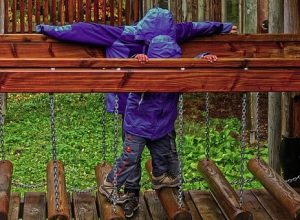SUBSCRIBERS’ HOME / UPDATES / FEATURES / NEW TO HOME EDUCATION? / PRACTICAL MATTERS / WEBSITES / RESOURCES / SEN / PLACES TO VISIT / SOCIAL LIFE / USEFUL INFORMATION / TUITION AND SERVICES / FROM YOU TO US
Lessons from lockdown
I don’t want to be accused of generalising, but as a long-time home educator living in western Cornwall I do come across some fairly radical thinkers, people prepared to think, and act, out of the box. But I must say, out of all the many, many, conspiracy-theory, religious, science-based, political, social-reform-centric conversation circles that I have been a part of or at least, listened in to, I didn’t hear or see this one, coronavirus lockdown, coming. It took me by such surprise that I think I am only just getting over it. ‘Surreal’ is the best word and even that sounds meaningless now because it has become so over-used. Whether it’s my subconscious safe-on-an-island mentality or just a more general it-won’t-ever-happen inclination, being asked, told, forced, to stay home hasn’t been easy to accept.

‘But surely this is normal for you? Your children are always at home, so what difference does this make to you?’, most of my neighbours have said, at a safe two metres distance of course, or by phone or email or however else they can possibly communicate their frustration and upset at having their small folk thrust under their feet. But theirs only equals my own frustration which is uncovered by how loudly I shout back across the two metres: ‘NO, NO, NO, IT ISN’T!’
This is not how home education works, folks. We don’t stay in all day barring a quick walk or cycle down the road and back. We don’t stay distanced from everyone else in case we catch some sort of schooling disease. We don’t leave our children while we queue for essential shopping which all has to be handled with rubber gloved disdain until wiped down with anti-bac cleanser. This – this anxiety, this fear, this precautionary shut-in isolation is not a home-educating life. It really isn’t, and we are struggling to adjust just as much as everyone else.
That having been said (and phew, yes, I do feel better now) there are elements to being a long-term, elective home educator that in all fairness have probably put us at an advantage. We don’t rely on daily, free childcare to free us up to work or relieve of us the need to occupy our brood. We are used to encouraging and including small people in home tasks: baking, cleaning, mending, gardening, washing the dog, whatever happens to need to be done. Most of us can see the educational potential in everything we do that needs to be done, so we perhaps have less anxiety about what we did ‘educationally’, each day – and by that I mean as defined by a comparison with school or desk-based activities. But, no social meets, no library, no shops, no neighbourly visits, no craft groups, no lego clubs, no Zumba kids, no soft play and indoor climbing, no gardening clubs, no horse riding, no forest school … it’s been, and still is, a challenge! And it’s certainly not normal.

So, how can we carry on with aplomb and enthusiasm appropriate to our experience and devotion to the home educating cause? What on earth do we do with this newly-common, small world?
First, take a big breath – for as long as you need. This is tough. This is shocking. This is frightening. Our world, as we knew it, has disappeared and life does not feel remotely normal; that is a huge knock to our confidence, security and sense of self and family too. Perhaps partners are home whereas previously the days were all about concentrating on the littles – that’s a tough change – no matter how much you love them, having an extra adult in your space, dividing your attention and carving a hole in your autonomy, is not easy. And propping them up emotionally and mentally when they are fearful about work, the future and their health as well as finding ways to occupy themselves adds a whole other dimension to the situation.
My advice? When you can, focus on the children and when you do, read a lot of stories. Sit down, whether sofa or blanket on the lawn; cuddle the small people to you and just read, read, read. Immerse them and yourself in Smuggler’s Top, Narnia and Green Knowe. Let the outside world go on turning while they make liberal use of pens and paper and draw what they hear, or whatever they want. Praise them lavishly, pin up the works or at the very least stick them in a scrapbook with a gorgeous cover and admire, love and applaud them. Give them clay, playdough, glue and glitter. Let them fiddle and create while you keep on reading. Take a break to make a play dough fawn or white rabbit though, just because you can. After all, there’s no hurry. And then read on.
Second, when you can, if you can, make the most of all the sudden free, home education-friendly and readily available ideas coming from YouTube and elsewhere. Daily PE with Joe Wicks, stories from Audible’s kids section, online live zoo feeding, aquarium visits and tours of the British Museum with Meander. Look around, look it up – take it one at a time, in your own time, and find what you think you all might enjoy. The world has never been so home education sympathetic, so milk it!
Third, try, when you can, if you can, to make some sort of schedule, even a vague, mental one. If, once the shock and fear had subsided, I have been left with anything to complain about it’s that, in the words of Morrisey himself, ‘every day is like Sunday’. Formless weeks can feel maddening, especially if you were used to being a busy, dynamic home-educating parent who loved to suck the marrow out of life (much better, who’s Morrisey when there’s Thoreau around?). Even a holiday-like book fest can become draining when meals and washing have been cast aside and everyone is hungry and complaining and you feel stuck in a dreary, mucky-jeaned groundhog day as you hand out yet another round of chocolate hobnobs.
We started with Joe Wicks. They did, I watched and cheered – in our pyjamas admittedly, but it got us up and started. Breakfast, reading, elevenses, reading soon morphed into him reading to me after breakfast while she drew pictures and asked for elevenses which became baking elevenses which was then a sort of outdoor chicken-chasing run-about, snack-and-bounce on the mini trampoline while I weeded the new vegetable patch. We invested in a maths learning app (DoodleMaths, it’s not cheap and it has an annoying tendency to home in on what the learner doesn’t know so well which is frustrating for a child who wants to shine and a parent who needs to do things with another small or clean the loo and so on. But the robot rewards are good and he seems to want to go back for more, so for now we’ll stick with it) which is followed by more reading aloud – me this time, and then a board game of some sort before lunch. Making lunch together gives them structure too and a chance to select from what you actually managed to procure in the supermarket rather than what they wish you had. After lunch a small puzzle or another game, and then the pièce de résistance: the project.
Project-based learning is something that all home educators can benefit from, whether they be virus-enforced or old hands. Google it – there are loads of people out there willing to sing its praises in far wordier ways than I, but to sum up:
- Let your child choose the topic. And yes, that means anything, JUST LET THEM CHOOSE.
- Let’s say they choose animals. You ask: ‘What’s your favourite animal, and what do you know about it?’ They write or draw everything they know. Don’t get anxious about perfect spelling or handwriting.
- Then you ask: ‘What else can we find out? For example: What does a tiger eat? How much does it eat? How heavy is it as a baby, and as it grows? and so on. Then they research using BBC documentaries, YouTube, Netflix, and write or draw or build or model what they find out. Take loads of photos and praise extensively.
- You ask: ‘What did you find especially interesting about that?’ It turns out that tigers live in the jungle. That’s exciting, so, ‘What do you know about the jungle?’ … return to step 2.

When they are bored with animals, then change the topic. Allow the whole thing to grow and change, keep all the work in a folder and look back together from time to time and see what wonders they came up with. Follow in perpetuity. Older children can go into more depth and follow geography, science, history leads as they wish; younger ones will probably just want to draw and watch videos and make the odd lego model , or loads of them, but it’s all amazing independent learning that it’s not hard to enthuse about and be supportive of or think of extra directions for if they seem stuck. Voila. A whole afternoon of educational fun that is project-based learning.
As of this moment, there is no real end in sight for the lockdown or for most of the many and varied ways in which our lives have been affected. I hope, for all our sakes, that the measures in place will have been effective and that our lives will find some degree of normality once more on the other side of this strange world. Meanwhile, while we remain well and we are simply knuckling down to some solid family time, it’s good to remind ourselves that this time doesn’t have to be remembered by the children as frightening or odd. They can look back on this as a wonderful few weeks when we read and played and cooked and cycled and walked and danced our days away and Mummy wasn’t stressing about shoes being on in five minutes or getting to music lessons on time. And maybe it’s there that we can find the lessons to be learned from lockdown.
© Melanie Crocker-Hulse
